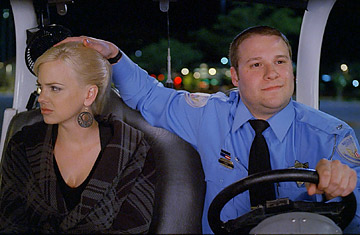
Anna Faris as Brandi and Seth Rogen as Ronnie in Observe and Report
(2 of 2)
That neat dichotomy — the tramp who turns Ronnie's head, the darling who's available to win his heart — should cue you that Observe and Report isn't going to have the courage to follow the premise to its logical conclusion. As ballsy as the movie is, it has one undescended testicle. It's bound to turn this disturbed cur into an underdog, and then a top dog. The bitter aftertaste that was permitted, in fact encouraged, in '70s movies is virtually verboten today. A feel-good ending is mandatory, even in a comedy like this, which promises to be transgressive because it's the first major-studio job for a director with an underground reputation for being crazy-bold.
Can a Comedy Be Cutting-Edge?
Aspiring filmmakers used to cut their teeth on R-rated horror movies; it was a genre that allowed them to show their skills of cinematic technique and audience manipulation (get 'em to scream). But with Apatovian buddy farce currently triumphant, more tyros are turning to R-rated comedy (get 'em to laugh). Here timing, not technique, is required: creating a vibe, working with actors, building a scene, knowing the audience. It's less like movie auteuring than like staging a play, but that's all right. Every film comedy needs a director, and these days there's a slew of comedies. It's one job market that's always hiring. And sometimes it pays off. David Wain, director of the semibiblical farce The Ten (domestic gross: $769,726), was signed to helm the Paul Rudd hit Role Models (d.g.: $67 million). Burr Steers jumped from the 2002 comedy Igby Goes Down (d.g.: $2 million) to next week's Zac Efron vehicle 17 Again. (See the top 10 movie performances of 2008.)
Three years ago, Hill, who did a spell at the University of North Carolina School of the Arts, made the nervy low-budget martial-arts parody The Foot Fist Way; it managed a limited release in 2008 and grossed a meager $234,286. But the only people who really have to see it are producers looking for directors, and Foot Fist did get noticed. This was thanks in part to the movie's rising star (and co-writer and UNCSA classmate) Danny McBride, who enlivened last year's Drillbit Taylor, Tropic Thunder and the Rogen-starring Pineapple Express, directed by another UNCSA alum, David Gordon Green. The stars were aligned; connections were secured. (Hill also works with McBride on the HBO series Eastbound and Down.) The kid was ready for his jump to the bigs.
He's written some excellent characters and gotten his actors to give them quirky life: Michael Pena as a lisping dude who seems to be Ronnie's firmest supporter on the security detail; John and Matt Yuan as twin mall-cop layabouts; Ray Liotta as a police detective who sneers away Ronnie's ambition to join the force; and especially Celia Weston as Ronnie's mother, who loves her son and her booze with equal, pathetic intensity. Weston and Rogen's scenes together have the sad, sloppy sweetness of two losers who care for each other because they're stuck together. After all, for most of the movie, each of them has no one else.
Rogen, in military short hair and a bulky frame that he's since slimmed down, adroitly navigates the course Hill has set for him: a high-strung bully until he's bullied (by the Liotta character) and becomes a figure of sympathy, someone we root for. About a half-hour into the movie, as you're settling in to the impression that Ronnie is rotten, Hill pulls out the disease card. Not to sound like Michael Savage, but these days every bad attitude is rationalized by being given its own disease. Ronnie, you see, is not a violent jerk; he's suffering from "just a little bipolar disorder," and he has the prescription medication to prove it. The film drops its Taxi Driver reverberations and heads for My Left Foot territory.
For all its salutary rudeness and its flashes of male nudity that few will find erotic, Observe and Report eventually chickens out. The apparently unbreakable rule of modern comedy is that audiences not only have to laugh while they're watching it, they must also leave with a smile, a glow that tells them all's right with the world, until they get back into the world. You can't have the cleansing anarchy and bile of classical comedy; that might sow sullen word of mouth and reduce the box-office revenue by a few dollars.
There ought to be room, especially in a time of recession and cynicism, for a form of humor that doesn't assuage but assaults. If we can get it on The Daily Show, which truly does observe and report, we ought to see it once in a while on the big screen. Comedies of the '70s turned the trick, but the people running the Hollywood laugh factory don't even try. Why'd you stop, malefactors?
